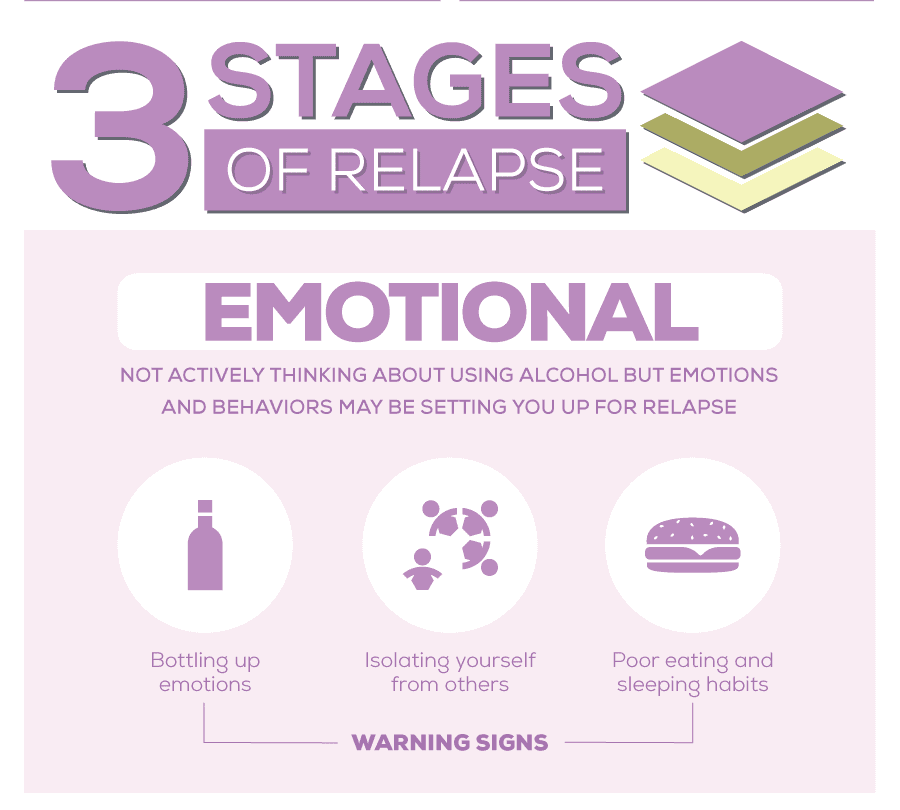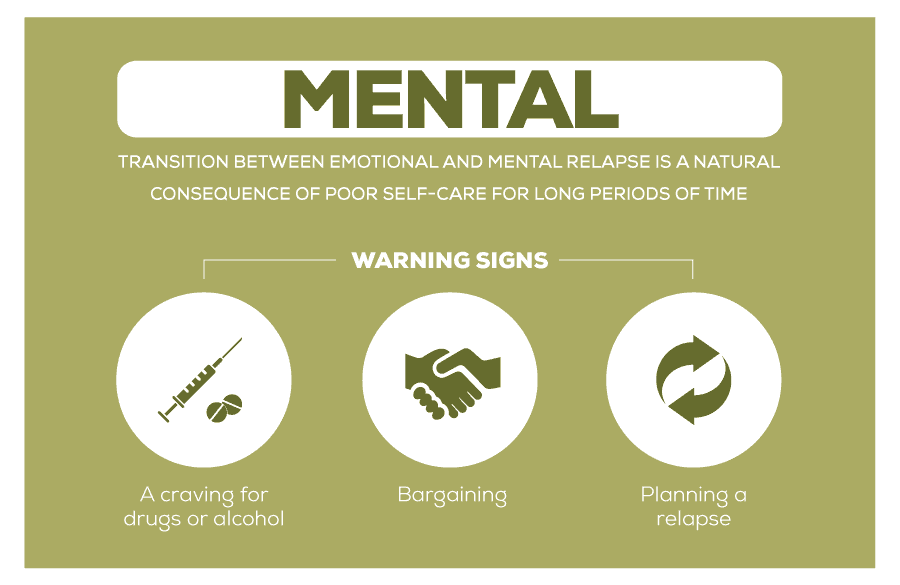It’s not very often that a recovering addict gets treatment, quits using drugs and/or alcohol, and never looks back. Addiction simply doesn’t work that way. Addiction is a disease. And like any disease, even effective treatment doesn’t guarantee that it won’t relapse after a certain period of time. In fact, drug addiction has similar relapse rates to that of type 1 diabetes and asthma. About 40 to 60 percent of those treated for drug addiction will relapse. And you know what? That’s okay. Recovery from addiction is a lifelong process, and the steps don’t always go in order. True recovery from drug addiction isn’t just a matter of removing the person from the drugs. The habit, stresses, and conditions that created the addiction in the first place are often deeply embedded and difficult to change. That’s why the most important thing to do in the face of relapse is to keep your hope alive. So much of recovery is a mental process, and giving up hope means falling back into drinking or drug use, and potentially even suffering a deeper descent than before.
Relapse Statistics: You’re Not the Only One
It’s not enough to say that relapse is a common occurrence. It’s more appropriate to say recovery without relapse is UNcommon. Many people will relapse into drug or alcohol use within a year of treatment. Some, like actor Phillip Seymour Hoffman, relapse after decades of being clean. It’s true that the risk of relapse decreases the more time you spend clean. One study found that for people who were able to stay abstinent from substance abuse for more than a year, the relapse rate shrunk to less than half. A survey of Alcoholics Anonymous (AA) members showed that the relapse rate for people within their first year of recovery was around 75 percent. However, for people who managed to stay sober for over five years, that rate reduced to seven percent. But the feeling never truly goes away. Addiction changes your brain chemistry and makes it so that you’re never completely free of the influence of drugs and alcohol. Your body will always remember the euphoria of using, regardless of how destructive it has been on your life. That’s what makes it an addiction.
Why Relapse Happens: Debunking Myths About Addiction and Relapse
There’s a common misperception about addiction and relapse that it’s all simply a matter of willpower. That people fall into addiction because they’re not “strong” enough. That relapse is about succumbing to “weakness.” Not only is that not true, the presence of that idea actually causes relapse in some cases. When people think that beating addiction is a simple matter of willpower, they are more likely to take themselves out of treatment or support, thinking they’re “strong enough” to beat the disease themselves. But that’s not how this works. This isn’t an issue of strength and weakness. When cancer comes out of remission, it isn’t because the patient wasn’t “strong” enough to keep it at bay. The same is true of addiction. Strength and weakness have nothing to do with it. Relapse isn’t a failure – it’s often part of the recovery process. Drug and alcohol recovery is a process, and part of that process is understanding exactly what effect the use of those substances has on you. If you’re early in the recovery process, you probably haven’t noticed the positive effects of recovery, and are instead focused on the negative – you miss drinking, or using drugs. The temptation is there, and it’s hard to ignore. Sometimes a relapse is how you remind yourself why you wanted to stop using substances in the first place. Falling back into that pit, remembering how hopeless and powerless you felt, this can be one of the best ways to keep you sober for good – so long as you hold onto hope and don’t give up on recovery. Relapse doesn’t mean treatment has failed, and it doesn’t mean you have failed. It just means that you may need to return to treatment or take a new approach to it. If you previously stopped drinking or using drugs through support groups, perhaps you want to try a professional rehab program. If you quit using outpatient therapy, maybe you need to try inpatient treatment. Or maybe simply returning for more of the same treatment is all you need to get yourself on the right track. There’s no one right answer. Like with any disease, sometimes treatment has to be adjusted and changed to get the right results. Sometimes that means a different kind of treatment, and sometimes it means the same treatment, but for a longer period of time. Regardless, the only wrong answer is to give up and let the disease win.
How to Stop Relapse, and What to Do if You Can’t Stop it
Relapsing, like recovery, is a process. Many people think it’s an event, and a sudden one at that, but it isn’t. Relapse isn’t something where a recovering alcoholic sits down in front of a glass of wine and is back in rehab the next day. Relapse happens in stages, and many of those stages are mental and internal.  Emotional relapse is the stage in which you start setting yourself up for trouble. You’re not thinking about a relapse or using at all, but you start to become emotionally volatile, defensive and isolated. You stop going to support meetings and stop accepting help from friends and loved ones. You stop taking care of yourself, and your sleeping and eating habits suffer. If you know to look for these signs, then you also know that they’re a precursor to worse things to come. If you can get support from someone close to you, or talk to someone about what’s happening, you can correct your course and prevent your relapse before it happens.
Emotional relapse is the stage in which you start setting yourself up for trouble. You’re not thinking about a relapse or using at all, but you start to become emotionally volatile, defensive and isolated. You stop going to support meetings and stop accepting help from friends and loved ones. You stop taking care of yourself, and your sleeping and eating habits suffer. If you know to look for these signs, then you also know that they’re a precursor to worse things to come. If you can get support from someone close to you, or talk to someone about what’s happening, you can correct your course and prevent your relapse before it happens.  Emotional relapse, when unchecked, sets you up for mental relapse. Mental relapse is when you start thinking about using it in the past, and you start missing it. You glorify your past use, thinking back on it positively and magnifying the good times, rather than the damage it caused. This is the stage at which temptation begins to grow uncontrollably. You may start falling into the old habits that surrounded your addiction, like hanging out with the friends you previously used with and lying to your loved ones to give yourself an opportunity to use. The best thing you can do here is to talk to somebody and be honest. Tell them what you’re feeling – that you’re thinking about using again, and you’re bargaining to make it seem okay. In your mind, you’re thinking that this time will be different, that you’ll be able to control yourself. But the whole point of drug and alcohol use is that it takes you out of control of your own body. If you can’t remember that and convince yourself of it, tell your family or a support group, and let them talk you out of it.
Emotional relapse, when unchecked, sets you up for mental relapse. Mental relapse is when you start thinking about using it in the past, and you start missing it. You glorify your past use, thinking back on it positively and magnifying the good times, rather than the damage it caused. This is the stage at which temptation begins to grow uncontrollably. You may start falling into the old habits that surrounded your addiction, like hanging out with the friends you previously used with and lying to your loved ones to give yourself an opportunity to use. The best thing you can do here is to talk to somebody and be honest. Tell them what you’re feeling – that you’re thinking about using again, and you’re bargaining to make it seem okay. In your mind, you’re thinking that this time will be different, that you’ll be able to control yourself. But the whole point of drug and alcohol use is that it takes you out of control of your own body. If you can’t remember that and convince yourself of it, tell your family or a support group, and let them talk you out of it.  Because the next step is a physical relapse, where you fall back into your drug use and return to your old habits. But even at this point, all is not lost. If you’ve physically relapsed, the next thing to do is to get yourself back into treatment. Don’t let yourself fall any deeper into addiction when you can start digging out immediately. Contact us today if you’re in the middle of a relapse, and we’ll help get you back on track.
Because the next step is a physical relapse, where you fall back into your drug use and return to your old habits. But even at this point, all is not lost. If you’ve physically relapsed, the next thing to do is to get yourself back into treatment. Don’t let yourself fall any deeper into addiction when you can start digging out immediately. Contact us today if you’re in the middle of a relapse, and we’ll help get you back on track.
What Did you Think About This Blog?
Give it a Rating!


